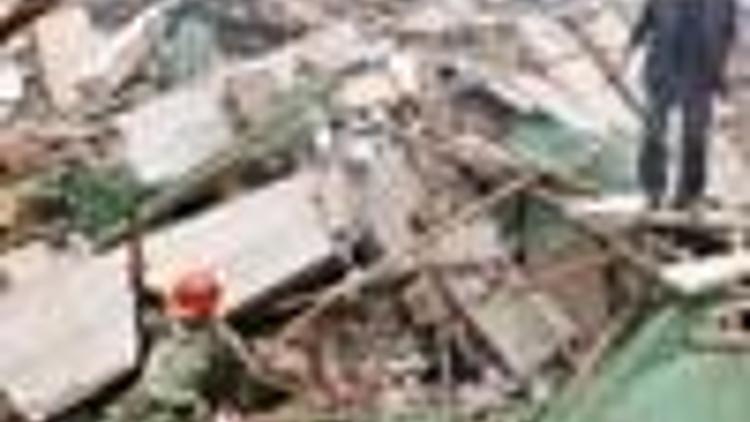China warns quake death toll could reach 50,000
Güncelleme Tarihi:

China warned the death toll from this week's earthquake could soar to 50,000, while the government issued a rare public appeal Thursday for rescue equipment as it struggled to cope with the disaster.
Rescue workers cleared roads to the epicenter in the race to find survivors.
More than 72 hours after the earthquake rattled central
The confirmed death toll reached 19,509, up from the nearly 15,000 confirmed dead the day before, according to the Earthquake and Disaster Relief Headquarters of the State Council, the country’s Cabinet. The council said deaths could rise to some 50,000, state TV reported.
In Luoshui town - on the road to an industrial zone in Shifang city where two chemical plants collapsed, burying hundreds of people - troops used a mechanical shovel to dig a pit on a hilltop to bury the dead. Two bodies wrapped in white sheets lay near the pit.
Police and militia in Dujiangyan pulverized rubble with cranes and backhoes while crews used shovels to pick around larger pieces of debris. On one side street, about a dozen bodies were laid on a sidewalk, while incense sticks placed in a pile of sand sent smoke into the air as a tribute and to dull the stench of death.
The bodies were later lifted onto a flatbed truck, joining some half-dozen corpses. Ambulances sped past, sirens wailing, filled with survivors. Workers asked the homeless to sign up for temporary housing, although it was unclear where they would live.
Not all hope of finding survivors was lost. After more than three days trapped under debris, a 22-year-old woman was pulled to safety in Dujiangyan. Covered in dust and peering out through a small opening, she was shown waving on state television shortly before being rescued.
"I was confident that you were coming to rescue me. Im alive. Im so happy," the unnamed woman said on CCTV.
An expert said the time for rescues was growing short. "Within 72 hours after the disaster is the critical period. Generally, the sooner the rescue of the buried, the better," the chief engineer of Shijiazhuang Bureau of Seismology, Liang Guiping, told state TV.
The government appealed to the Chinese public calling for donations of rescue equipment including hammers, shovels, demolition tools and rubber boats. The plea on the Ministry of Information Industry’s Web Site said, for example, that 100 cranes were needed.
More than 130,000 soldiers and police joined the relief operation, Xinhua said.
"This is only a beginning of this battle, and a long way lies ahead of us," Vice Health Minister Gao Qiang told reporters in
Premier Wen Jiabao visited Qingchuan in northern
No outbreaks of disease had struck refugees, who were being immunized against some illnesses, Gao said. Workers were seeking to ensure safety of drinking water and removing corpses to prevent the spread of bacteria.
The International Federation of Red Cross and Red Crescent Societies issued an emergency appeal for medical help, food, water and tents.
Gu Qinghui, the federations disaster management director for
Plans for the Defense Ministry to deploy 101 more helicopters underscored worries that a death toll will skyrocket as time runs out for buried survivors. Nearly 26,000 people remained trapped in collapsed buildings. �
Forty-four counties and districts in
Roads were cleared Thursday to two key areas that felt the brunt of the quakes force, with workers making it to the border of Wenchuan county at the epicenter and also through to hard-hit Beichuan county, Xinhua reported. Communication cables were also reconnected to Wenchuan.
Roads to the epicenter had been blocked by debris since the 7.9 magnitude quake, preventing rescuers from moving heavy equipment to the worst-affected areas. Previously, soldiers riding to isolated mountain villages on helicopters and small boats had been forced to dig for survivors with their hands.
Dujiangyan city was clogged with buses and trucks decked out with banners from companies saying they were offering aid to the disaster area. One tour bus was stuffed full of water bottles, cartons of biscuits and instant noodles.
Public donations so far have totaled 1.3 billion yuan (US$186 million, 120 million) in cash and goods, Xinhua said.
NBA star Yao Ming, China's most famous athlete, was planning to donate 2 million yuan ($285,000) to the relief effort, agent Erik Zhang said. "My thoughts are with everyone back in my home country of
North of Chengdu in Deyang, the largest town near the devastated areas of Hanwang and Mianyang, thousands of people have streamed into the city hospital, mostly with head or bone injuries.
Patients heavily wrapped in bandages and with cuts and bruises were huddled in canvas tents in the hospitals parking lot.
"Our doctors have worked continuously since Monday and people keep coming in. We have to keep strengthening our measures to keep up," said Luo Mingxuan, the Communist Party secretary of the hospital.

